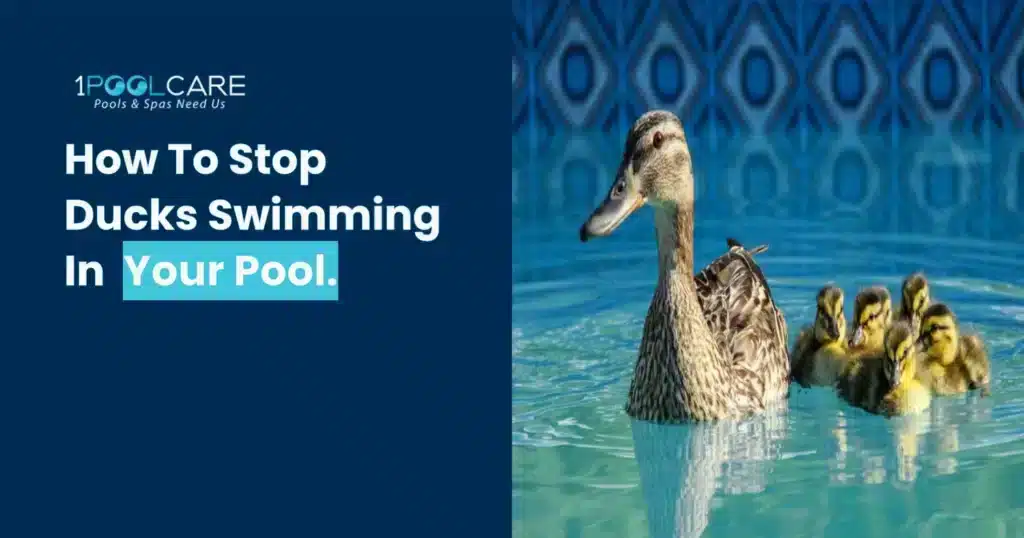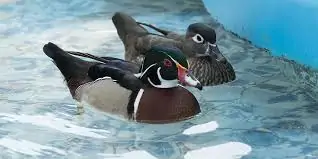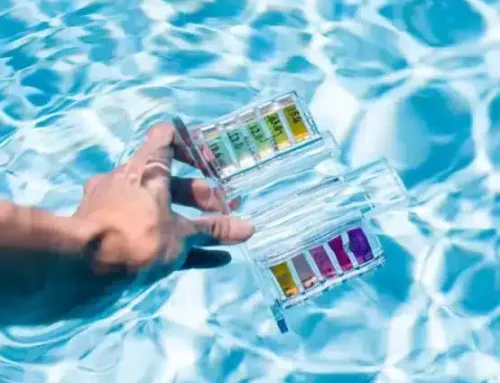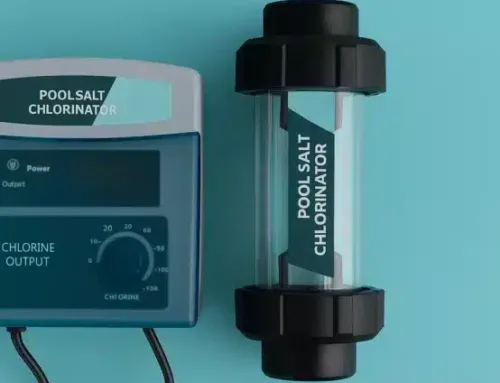
Ducks visit backyard pools because they see a quiet, reflective water surface with few predators and easy access. While a pair might look harmless, duck droppings introduce bacteria and parasites, stain surfaces, and consume chlorine. Use this guide to understand why ducks choose pools and the safest, most effective ways to discourage them without harming wildlife.
Why do ducks swim in swimming pools?
Calm, open water with nearby shelter, food, and minimal disturbance attracts ducks. A glossy pool surface looks like a safe pond, especially in suburbs where natural water is scarce. Low fences, quiet gardens, and overhanging trees create a comfortable landing zone.
Common attractants
- Still water with clear approach and exit points
- Overhanging trees, tall grass, or hedges that provide cover
- Regular food sources in the yard, including pet bowls and bird feeders
- Shallow steps that look like an easy resting spot
Is it bad to have ducks in your pool?
Yes. Duck droppings reduce water quality, increase chlorine demand, and can spread pathogens. Organic debris also feeds algae and can stain pool surfaces. Repeated visits teach others to return.
Can duck droppings make pool water unsafe?
Yes. Faeces can introduce harmful microorganisms and raise combined chlorine. Respond quickly by removing solids, raising free chlorine, and running the filtration system until the water clears.
Clean up steps after a visit
- Net out solids and any feathers. Empty skimmer baskets
- Brush steps and the waterline where birds rested
- Raise free chlorine to 5 to 10 ppm with the pump running and keep pH 7.2 to 7.6
- Circulate at least one full turnover, then retest free chlorine
What attracts ducks to backyard pools?
Shelter, food, and still water are the main triggers. Bird feeders, pet food, and lawns that stay damp after irrigation all signal an easy meal and a place to rest.
Reduce the appeal
- Remove bird feeders and secure pet bowls indoors
- Trim hedges and tall grass to reduce cover near the pool area
- Keep the pool deck dry and tidy, and blow leaves off daily
Are ducks dangerous to pool water chemistry?
They raise organic load, which consumes free chlorine and can drive cloudy water or algae. Droppings also add phosphates that act as an algae nutrient. Expect to use more sanitiser when birds visit.
Do pool covers keep ducks away?
Yes. A properly fitted pool cover is one of the most effective deterrents. Solid safety covers, automatic slatted covers, and tight fitting solar blankets block access and prevent a clean landing zone.
Cover tips
- Keep the cover on when the pool is not in use, especially at dawn and dusk
- Use a roller so deployment is easy and consistent
- For solar covers, fit to the waterline with minimal gaps so feet cannot reach the surface
Is it legal to remove ducks from your pool in Australia?
Native ducks are protected wildlife. Do not harm them. Discourage visits with humane deterrents and check local council or state guidance before handling or relocating birds. If a bird is trapped or injured, contact a licensed wildlife carer.
Do fake predators like owls or crocodiles work?
Sometimes and usually only for a short time. Stationary decoys lose effect as ducks learn they do not move. Improve results by rotating position and pairing visual decoys with movement or sound.
Decoy use
- Move decoys daily and vary positions
- Choose reflective eyes or models with slight motion
- Combine with motion sprinklers for a surprise cue
Can sound or motion sensors deter ducks?
Yes. Motion activated sprinklers, lights, and ultrasonic units can startle birds and interrupt landing. Sprinklers that fire a short burst of water are often the most effective and do not affect neighbours.
Are ducks a problem for saltwater pools too?
Yes. Saltwater pools still rely on free chlorine for sanitation and are not less attractive to ducks. Keep the salt cell clean and run time long enough to recover after a visit.
What poolside changes keep ducks away long term?
Make the pool area feel less safe and reduce open water cues. Simple landscaping changes and surface disruption work well.
Long term deterrents
- Fencing or glass balustrades: reduce straight line approaches and landing space
- Tensioned lines: run light nylon line 10 to 20 cm above the water in a criss cross pattern when the pool is idle to break up surface access. Remove before swimming
- Floating obstacles: use a few large floating toys or a purpose made duck deterrent float to break the reflection
- Water movement: operate a bubbler, fountain, or return jets to create ripples at dawn and dusk
- Vegetation management: prune overhanging branches and thin dense shrubs near the pool area
Do chemical duck repellents work?
Some liquid repellents reduce surface attraction, but results vary. Always choose pool safe products and follow the label. Many homeowners find physical barriers and motion deterrents more reliable.
Will a robotic cleaner help?
Yes as part of a broader plan. Frequent movement in the water and on the floor discourages resting. Running the robot in the early morning can also clean droppings quickly if birds visit overnight.
Step by step plan to keep ducks out
Use this layered approach to stop visits and protect water quality.
- Respond to the first visit
Remove droppings, shock to 5 to 10 ppm, and run the filter. Clean baskets and brush resting areas. - Cover the pool whenever possible
Deploy a cover daily. If a solid or safety cover is not practical, keep a solar cover on when not swimming. - Disrupt the landing zone
Add one or two large floating objects, operate return jets for ripples, and string two light nylon lines across the short axis a hand width above water. Remove lines before swimming. - Remove attractants
Bring pet bowls inside, stop feeding birds, and tidy lawns, decks, and garden beds around the pool. - Add motion deterrents
Install a motion sprinkler aimed across the water surface. Rotate decoys every day or two. - Trim and tidy
Cut back overhanging branches, reduce tall grass near the coping, and clear leaf litter that hides insects. - Keep chemistry steady
Hold free chlorine at target and vacuum debris quickly so the pool remains clean and unattractive to wildlife.
What should you avoid?
Do not harm wildlife, use sticky substances on coping, or run trip lines that create a hazard. Avoid loud devices that disturb neighbours. If a duck nests nearby, seek wildlife advice rather than moving eggs.
How do you fix water after ducks visit?
Sanitise, filter, and clean surfaces. Duck visits raise organic load and can introduce pathogens.
Recovery checklist
- Remove solids with a net and empty baskets
- Brush the pool walls, steps, and benches
- Raise free chlorine to 5 to 10 ppm and circulate for at least one turnover
- Vacuum the pool floor. Backwash a sand filter or hose a cartridge as needed
- Recheck free chlorine and pH and return to normal targets
If the water turns murky or green after heavy contamination, our green pool recovery service can take the hassle out of it.
Quick answers to common questions
Can pool covers keep ducks off completely? Good covers make access difficult and usually stop visits, especially when combined with motion deterrents.
Do fake crocodiles work on Australian ducks? Sometimes. Move them often and pair with movement or sprinklers.
Will salt scare ducks away? No. Saltwater pools are still attractive open water.
Is it legal to remove wild ducks? Native ducks are protected. Use humane deterrents and contact a licensed carer if birds are trapped or injured.
Will ducks damage water chemistry long term? Not if you respond quickly. Remove droppings, raise free chlorine, and run filtration until clear.
Bottom line
To stop ducks swimming in your pool, combine a reliable cover with surface disruption, motion deterrents, and simple yard changes that remove shelter and food. Keep water balanced, clean up quickly after any visit, and use only humane methods. With a layered plan, ducks will move on and your pool will stay clean, safe, and ready to swim. For ongoing help and seasonal check-ups, our pool maintenance team can keep everything dialled in so reach out today

With over 20 years of industry experience, Adrian Mole is the founder of 1 Pool Care, a leading mobile pool service in Perth. Known for his expert knowledge and reliable service, Adrian delivers professional pool cleaning, equipment repairs, and water balancing across the metro area. Backed by SPASA accreditation, he’s committed to quality, convenience, and customer satisfaction.











Social Media